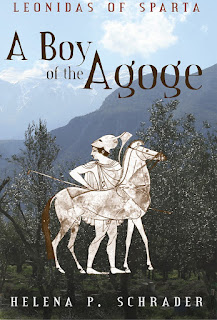Chilon's saying translated either as "nothing in excess" or "everything in moderation" was carved in stone at the sacred pan-Hellenic site of Delphi. It was recognized as wise advice to all Greeks. Yet it was only in his native Sparta that the concept of avoiding excess was internalized and enshrined in daily behavior. Spartan culture proscribed, for example, economy in the use of words, in drinking, in eating, in making love and in dress and decoration.
The Spartan disdain for excessive drinking was legendary to the point where Spartans were willing to blame the madness of a king (Cleomenes I) on nothing more than drinking his wine "neat" (i.e. unmixed with water). When it comes to food, Xenophon claimed that boys of the agoge received short rations, while grown men in the syssitia were fed a restricted diet. According to Plutarch even sex was inhibited in Sparta, with newlyweds forced to engage in various tricks and deceit in order to come together.
The Spartan disdain for excessive drinking was legendary to the point where Spartans were willing to blame the madness of a king (Cleomenes I) on nothing more than drinking his wine "neat" (i.e. unmixed with water). When it comes to food, Xenophon claimed that boys of the agoge received short rations, while grown men in the syssitia were fed a restricted diet. According to Plutarch even sex was inhibited in Sparta, with newlyweds forced to engage in various tricks and deceit in order to come together.
Most ancient commentators praise Sparta’s culture of “less is more.” Xenophon claims that the short rations of the agoge helped boys to grow tall, while the syssitia’s rigid regime kept men from growing fat. Plutarch suggests that Spartan marriage customs increased affection between young couples by restricting their ability to sate passion, apparently on the assumption that too much sex leads to disinterest. Certainly, Spartan prudery was viewed by philosophers as more admirable than the reverse. The benefits of teaching children silence were, of course, widely eulogized and Laconic speech particularly praised by Plato and the philosophers.
Modern commentators, in contrast, are more likely to focus on the harshness of Spartan society. Sparta is frequently compared to totalitarian societies in which freedom is sacrificed for conformity and the state is ever-present. The emphasis is on children torn away from their parents, on young men confined to barracks rather than living with their wives, on adults with no choice of profession, and soldiers expected to die rather than retreat even in hopeless situations.
Yet Chilon’s admonishment applied to excessive cruelty, brutality, rigidity, hatred and violence as much as to excessive luxury, food or sex! Nothing in excess means exactly that. Sparta was no Taliban state in which pleasure, music and sport were forbidden. On the contrary, in Sparta music and dance were valued nearly as much as valor on the battlefield.
Yet Chilon’s admonishment applied to excessive cruelty, brutality, rigidity, hatred and violence as much as to excessive luxury, food or sex! Nothing in excess means exactly that. Sparta was no Taliban state in which pleasure, music and sport were forbidden. On the contrary, in Sparta music and dance were valued nearly as much as valor on the battlefield.
Even war itself was not adored, but rather seen as a dangerous passion that-- just like appetite and lust –- needed to be controlled. This attitude was symbolized by a temple in which Ares was chained. Spartans feared an unleashed God of War as much –- if not more –- than they feared an uninhibited Aphrodite. The cult of Aphrodite, after all, first took root in Lacedaemon, on Kythera, and according to some sources the Spartans sacrificed to Eros on the eve of battle – not to Ares.
Yet arguably the greatest evidence that Spartan society was not grim was the fact that Sparta had a temple to laughter and so a cult of happiness. To my knowledge, no other ancient city-state shared this open and explicit adulation of happiness. To be sure, Sparta also had a temple to fear, and it would be wrong to argue that Spartans “adored” fear.
Rather, temples were built to all supernatural forces which mortals needed to respect. The Spartans knew that fear was powerful and could seize control of even the bravest heart, therefore it was a force to reckoned with and respected, like death itself. The significance of a temple to laughter is that it shows that Spartans, far from scorning the light side of life, joy and humor, recognized the power of laughter no less than that of fear. Unlike any other ancient society that I know of, it placed enjoying life on a par with the undeniably dark forces of death and fear. (See also: Loving Life inLacedaemon.)
Spartans and their unique culture are depicted as realistically as possible in all my Spartan novels:
Rather, temples were built to all supernatural forces which mortals needed to respect. The Spartans knew that fear was powerful and could seize control of even the bravest heart, therefore it was a force to reckoned with and respected, like death itself. The significance of a temple to laughter is that it shows that Spartans, far from scorning the light side of life, joy and humor, recognized the power of laughter no less than that of fear. Unlike any other ancient society that I know of, it placed enjoying life on a par with the undeniably dark forces of death and fear. (See also: Loving Life inLacedaemon.)
Spartans and their unique culture are depicted as realistically as possible in all my Spartan novels:









